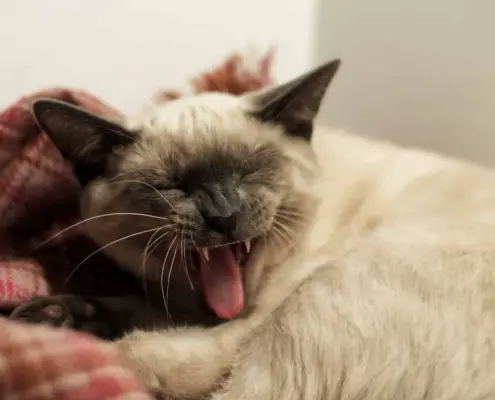
Cats, just like humans, have different blood types that play a crucial role in their overall health and well-being. Understanding these blood types is essential for every cat owner to ensure the best possible care for their feline companions. In this article, we will delve into the importance of knowing your cat’s blood type and how it can impact their health.
Why Knowing Your Cat’s Blood Type is Important
Knowing your cat’s blood type is vital for several reasons. Firstly, it helps veterinarians during emergencies or surgeries when blood transfusions may be required. Different blood types have specific characteristics, and using a compatible blood type ensures a successful transfusion without complications. Additionally, understanding your cat’s blood type can help prevent adverse reactions to medications or treatments that may be influenced by their blood type.
Common Cat Blood Types and Their Characteristics
There are several blood types found in cats, but the two most common ones are Type A and Type B. Type A is the most prevalent, with approximately 95% of domestic cats having this blood type. On the other hand, Type B is relatively rare, found in around 1% of cats. Cats with Type A blood can safely receive Type A or Type AB blood, while those with Type B blood require Type B or Type AB blood. Type AB is the rarest blood type in cats and can be considered a universal recipient.
Blood Transfusions in Cats: When Are They Necessary?
Blood transfusions in cats are necessary in various situations, such as severe injuries, acute illnesses, or during surgical procedures. If a cat has lost a significant amount of blood or is experiencing internal bleeding, a transfusion can be life-saving. Additionally, cats with certain chronic conditions, like autoimmune diseases or anemia, may require regular transfusions to maintain their health. It is crucial to have knowledge of your cat’s blood type to ensure a successful and compatible transfusion if the need arises.
How to Determine Your Cat’s Blood Type
Determining your cat’s blood type can be done through a simple blood test performed by your veterinarian. This test will identify whether your cat has Type A, Type B, or Type AB blood. It is especially important to know your cat’s blood type if you plan on breeding them, as certain blood type combinations can result in health complications for both the mother and the kittens.
Risks and Complications Associated with Mismatched Blood Types
Mismatched blood transfusions can have severe consequences for cats. When a cat receives blood that is not compatible with their own blood type, it can lead to a potentially fatal reaction known as a transfusion reaction. Symptoms of a transfusion reaction include fever, vomiting, rapid breathing, and collapse. To avoid these risks, it is crucial to ensure blood type compatibility before any transfusion takes place.
The Importance of Blood Type Compatibility in Breeding Programs
Blood type compatibility is of utmost importance in breeding programs. Breeding two cats with incompatible blood types can result in neonatal isoerythrolysis (NI), a condition where the mother’s antibodies attack the blood cells of the kittens. This can lead to severe anemia and even death in the affected kittens. By understanding the blood types of the breeding cats, breeders can select compatible pairs, reducing the risk of NI and promoting the health of the kittens.
Cat Blood Type Testing Options
There are several testing options available to determine a cat’s blood type. The most common method is a serological test, which involves mixing the cat’s blood with known antibodies to identify their blood type. Another option is DNA testing, which provides accurate results and is particularly useful for breeding programs. Your veterinarian can guide you in choosing the most appropriate testing method for your cat.
How to Manage and Care for Cats with Specific Blood Types
Once you know your cat’s blood type, it is essential to be aware of any specific care requirements associated with that blood type. For example, cats with Type B blood may be more prone to developing certain health conditions, such as urinary tract diseases. By understanding these potential risks, you can take proactive measures to prevent or manage them effectively. Regular check-ups with your veterinarian and a balanced diet tailored to your cat’s specific needs are essential for maintaining their overall health.
The Significance of Knowing Your Cat’s Blood Type
In conclusion, knowing your cat’s blood type is crucial for their well-being and can make a significant difference in their healthcare. It allows veterinarians to provide appropriate treatments, perform safe surgeries, and administer blood transfusions if necessary. It also plays a pivotal role in breeding programs, ensuring the health of the mother and the kittens. By understanding your cat’s blood type, you can be better prepared to provide the best possible care for your feline companion.
Remember, if you are unsure about your cat’s blood type, consult your veterinarian. They can perform the necessary tests and provide you with the information needed to give your cat the care they deserve.
If you enjoyed my article, I would appreciate you sharing it with your network.

Sima Ndlebe
Sima writes for CatBuzz. He is interested in Cats, Health and Fitness, and Entrepreneurship.
Published: 13 October 2023
Related Articles
Disclaimer
The content found on CatBuzz.org is presented on an "as is" basis and is intended for general consumer information and education purposes only. Any utilization of this information is voluntary and solely at the user's own risk.
None of the articles or content should be regarded as, or used in place of, veterinary medical advice, diagnosis, or treatment. The information provided on the website is purely for educational and informational intentions and should not be considered a substitute for professional guidance from a veterinarian or other qualified expert. The articles are designed to inform consumers about veterinary healthcare and medical matters that may impact their cat's daily life. It should be noted that this website and its services do not constitute the practice of any form of veterinary medical advice, diagnosis, or treatment. CatBuzz.org explicitly disclaims any liability for any direct or indirect damages or losses that may arise from the use of or reliance on the information contained within the content.
Consumers must consult a veterinarian, veterinary specialist, or another qualified veterinary healthcare provider when seeking advice regarding their cat's health or medical conditions. It is important not to ignore, avoid, or postpone seeking medical advice from a veterinarian or other qualified veterinary healthcare provider solely based on information obtained from this website. If you believe that your cat may be experiencing a medical issue or condition, it is imperative to promptly contact a qualified veterinary healthcare professional.



